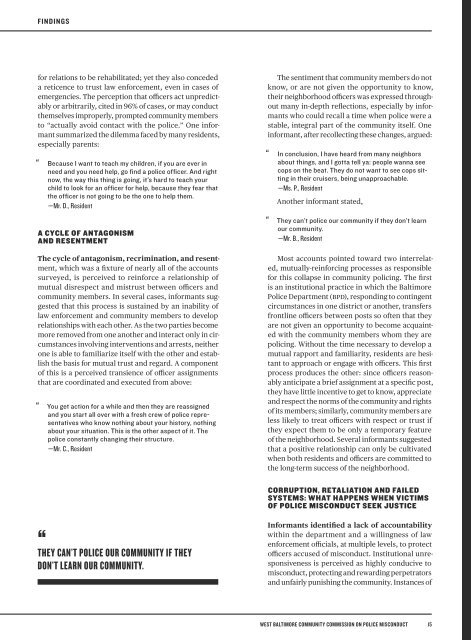OVER-POLICED YET UNDERSERVED POLICE MISCONDUCT IN WEST BALTIMORE
No-Boundaries-Layout-Web-1
No-Boundaries-Layout-Web-1
Create successful ePaper yourself
Turn your PDF publications into a flip-book with our unique Google optimized e-Paper software.
F<strong>IN</strong>D<strong>IN</strong>GS<br />
for relations to be rehabilitated; yet they also conceded<br />
a reticence to trust law enforcement, even in cases of<br />
emergencies. The perception that officers act unpredictably<br />
or arbitrarily, cited in 96% of cases, or may conduct<br />
themselves improperly, prompted community members<br />
to “actually avoid contact with the police.” One informant<br />
summarized the dilemma faced by many residents,<br />
especially parents:<br />
““<br />
Because I want to teach my children, if you are ever in<br />
need and you need help, go find a police officer. And right<br />
now, the way this thing is going, it’s hard to teach your<br />
child to look for an officer for help, because they fear that<br />
the officer is not going to be the one to help them.<br />
—Mr. D., Resident<br />
A CYCLE OF ANTAGONISM<br />
AND RESENTMENT<br />
The cycle of antagonism, recrimination, and resentment,<br />
which was a fixture of nearly all of the accounts<br />
surveyed, is perceived to reinforce a relationship of<br />
mutual disrespect and mistrust between officers and<br />
community members. In several cases, informants suggested<br />
that this process is sustained by an inability of<br />
law enforcement and community members to develop<br />
relationships with each other. As the two parties become<br />
more removed from one another and interact only in circumstances<br />
involving interventions and arrests, neither<br />
one is able to familiarize itself with the other and establish<br />
the basis for mutual trust and regard. A component<br />
of this is a perceived transience of officer assignments<br />
that are coordinated and executed from above:<br />
““<br />
You get action for a while and then they are reassigned<br />
and you start all over with a fresh crew of police representatives<br />
who know nothing about your history, nothing<br />
about your situation. This is the other aspect of it. The<br />
police constantly changing their structure.<br />
—Mr. C., Resident<br />
The sentiment that community members do not<br />
know, or are not given the opportunity to know,<br />
their neighborhood officers was expressed throughout<br />
many in-depth reflections, especially by informants<br />
who could recall a time when police were a<br />
stable, integral part of the community itself. One<br />
informant, after recollecting these changes, argued:<br />
““<br />
In conclusion, I have heard from many neighbors<br />
about things, and I gotta tell ya: people wanna see<br />
cops on the beat. They do not want to see cops sitting<br />
in their cruisers, being unapproachable.<br />
—Ms. P., Resident<br />
Another informant stated,<br />
““<br />
They can’t police our community if they don’t learn<br />
our community.<br />
—Mr. B., Resident<br />
Most accounts pointed toward two interrelated,<br />
mutually-reinforcing processes as responsible<br />
for this collapse in community policing. The first<br />
is an institutional practice in which the Baltimore<br />
Police Department (bpd), responding to contingent<br />
circumstances in one district or another, transfers<br />
frontline officers between posts so often that they<br />
are not given an opportunity to become acquainted<br />
with the community members whom they are<br />
policing. Without the time necessary to develop a<br />
mutual rapport and familiarity, residents are hesitant<br />
to approach or engage with officers. This first<br />
process produces the other: since officers reasonably<br />
anticipate a brief assignment at a specific post,<br />
they have little incentive to get to know, appreciate<br />
and respect the norms of the community and rights<br />
of its members; similarly, community members are<br />
less likely to treat officers with respect or trust if<br />
they expect them to be only a temporary feature<br />
of the neighborhood. Several informants suggested<br />
that a positive relationship can only be cultivated<br />
when both residents and officers are committed to<br />
the long-term success of the neighborhood.<br />
CORRUPTION, RETALIATION AND FAILED<br />
SYSTEMS: WHAT HAPPENS WHEN VICTIMS<br />
OF <strong>POLICE</strong> <strong>MISCONDUCT</strong> SEEK JUSTICE<br />
“<br />
THEY CAN’T <strong>POLICE</strong> OUR COMMUNITY IF THEY<br />
DON’T LEARN OUR COMMUNITY.<br />
Informants identified a lack of accountability<br />
within the department and a willingness of law<br />
enforcement officials, at multiple levels, to protect<br />
officers accused of misconduct. Institutional unresponsiveness<br />
is perceived as highly conducive to<br />
misconduct, protecting and rewarding perpetrators<br />
and unfairly punishing the community. Instances of<br />
<strong>WEST</strong> <strong>BALTIMORE</strong> COMMUNITY COMMISSION ON <strong>POLICE</strong> <strong>MISCONDUCT</strong> 15


